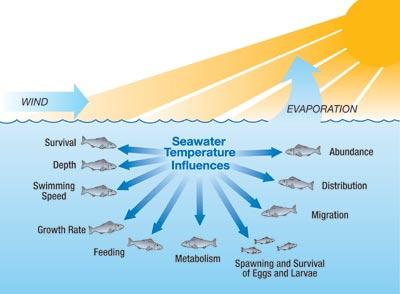Most every aspect of a fish's life is influenced by water temperature, which in turn is affected by wind, seasons, currents, and evaporation.
A few species, such as bluefin tuna, are somewhat warm-blooded in that they can control the temperature of some important organs, most notably their brain. They do this by using muscle movement to generate heat. This warm-blooded aspect allows bluefin tuna to range widely over the ocean since they will be little affected by the fluctuating water temperatures.
Cold-blooded fish, however, do not have this luxury, and they must stay within a narrower temperature range. Their ability to navigate within this invisible field, and to sometimes acclimate along its harsher edges, influences everything from how and when fish feed, to where they stay, when they migrate, and when and where they spawn (see figure).
Temperature changes occur both horizontally and vertically with depth, making the comfort zone a constantly moving target. Fortunately for cold-blooded fish, water has a high heat capacity. In simplest terms, this means that the water temperature changes slowly. Because of this, most fish are rarely trapped by a major shift, since any change will be slow enough to allow them to escape. This is important because most fish are very susceptible to abnormally rapid changes in water temperature.
Because cold-blooded fish live within a small temperature range, they can do little more than leave an area once the water reaches their high or low tolerance limit. Many fish try to stay within what is called their thermal optimum — not too warm, not too cold — just right. This thermal optimum varies for different species. The temperature range for striped bass is thought to be between 50 and 75 degrees, with their thermal optimum from 55 to 65 degrees. For stripers, or any other fish, these numbers are not rigid barriers. In fact, if necessary, most fish can spend some time outside of their temperature range.
http://www.midcurrent.com/articles/science/ross_thermal_optimum.aspx
